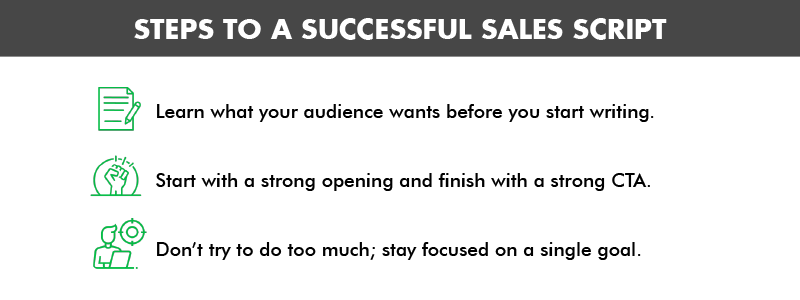Unlocking the Secrets of Successful Sales Managers
Developing these skills can help sales managers turn frustrating obstacles into opportunities for success.


A winning sales script is the key weapon in your company’s promotional arsenal. It gives your sales team valuable tools in the form of questions and responses to guide prospects along the path to purchase. The ideal sales script is a guidebook, not a rulebook. It should be flexible, not rigid. Your team members shouldn’t feel like they have to repeat it word-for-word. Every successful sales interaction involves a certain amount of improvisation. The script is there to point your team in the right direction.
Below, we will provide a solid foundation of knowledge on writing and delivering effective, compelling sales scripts, no matter if you’re a business owner, a middle manager, or a chief marketing officer.
A prospect in one industry is going to have different wants and needs than one in another industry, and this is often true even of prospects in the same industry. Rather than relying on a one-size-fits-all script that won’t be truly effective for any audience, customize your statements and questions to fit more specific categories of potential buyers. Research each new client and learn the unique challenges of their particular job, the larger concerns facing their company, their competition, and anything else that might help shape a narrative.
Make sure your script covers the entire sales process, as well. Someone who’s just entering your pipeline requires a different approach than someone who’s on the verge of closing a deal. It’s not a good look if a rep uses the same introductory script for a prospect who’s previously met with other staff members, so it’s crucial to track every touch point a prospect has with your team and meet them where they are in the process.
You’ll also want to familiarize yourself with your audience’s pain points and focus on how your product or service can help alleviate them. Do your research and use this valuable data to develop your script.
There are multiple components to a strong opening of your sales script.
While all of these elements are designed to help you win new business, well-crafted sales scripts have the added benefit of allowing you to quickly onboard new team members. By standardizing the learning process with sales scripts, you can provide quick answers to the basic questions every fresh employee brings to the table, leaving them more time to learn the fine details of your business.
A well-produced script is a key tool to grow your pool of leads, build rapport with potential customers, and, eventually, convert more sales. They can also boost employee morale and lower stress. So how do you actually put together a winning sales script?
Most prospects aren’t going to do business with someone they don’t trust, so establishing credibility is one of the most important elements of your sales script. A credible salesperson comes across as sensible and competent with a pleasant demeanor and demonstrably good judgment. These qualities help forge a connection with your audience and build the foundations of a deeper relationship. The more your reps can demonstrate their knowledge and experience, the easier it will be to establish credibility.
The best sales call can fall flat if it ends with a lousy call to action (CTA). Go back to your objective – whatever intent you came in with – and do your best to bring the prospect there with you. The best clients are often the busiest, so the easier you make it for them to take the next step, the better. That keeps you in control and makes them feel like they’re in good hands.
It doesn’t matter if you’re new to the sales game or a veteran with decades of experience, you need a library of powerful, effective scripts to bring prospects in, no matter where they are in the sales cycle. The best sales scripts are organic, living documents, constantly being analyzed, tweaked, and improved to match the needs of new clients.
While this may seem like a daunting task, there are experienced professionals out there who can help. With thousands of hours of sales consulting experience, the team at MetaGrowth Ventures stands ready to help transform your staff into the world-class sales team of your dreams. Contact us now to find out more.
Written by
Josh Hirsch
Developing these skills can help sales managers turn frustrating obstacles into opportunities for success.
As a sales manager, your success no longer hinges on smashing your own quotas. It’s about managing and
Roleplaying can be a valuable tool for helping your sales staff learn how to handle real-world situations.
How to keep your customers happy, build lasting relationships, and close more deals by taking the pressure